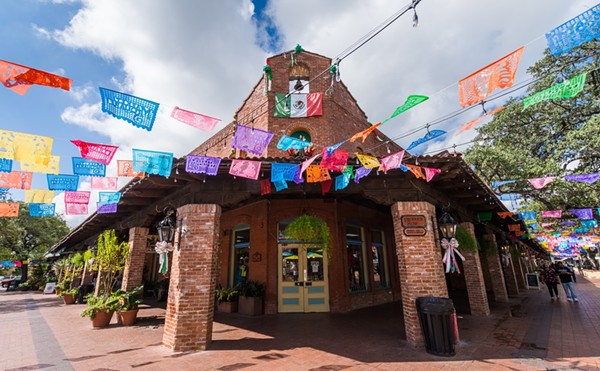Oh, how the gods must be laughing: In late June, just as tremendous rainstorms started to sweep across south Texas, the United States and Mexico finally reached a modest compromise agreement on a longstanding water dispute between the two countries.
Mexico currently owes the U.S. a staggering 1.5 million acre-feet of water from Rio Grande tributaries under terms of the 1944 Water Treaty; put in other terms, that's about half a trillion gallons. Our southern neighbor had steadfastly refused to open the taps for the past decade, arguing that its water reserves had shrunk due to an ever-deepening drought. Those claims fell on deaf ears as water-thirsty Texas irrigators also suffered from too-little rain. This spring they put enough pressure on former Agriculture Commissioner and now-Governor Rick Perry, and his predecessor in Austin, now-President George W. Bush, to accelerate the talks with Mexico. Yet negotiations produced little in the way of relief; while the ground baked in the early summer sun, tempers flared.
How apt, then, that the two sides managed to broker an agreement of sorts just as the rain began to fall. Yet like most treaties, this one was less than complete. Under the terms announced on June 28, Mexico agreed to release 91,000 acre-feet of water from the Falcon International Reservoir, approximately 6 percent of the amount it owes the U.S. Even before these terms were officially announced, Governor Perry, with his gubernatorial bid surely in mind, praised the resolution and trumpeted the virtues of valley farmers. "My hat's off to the agriculture producers down here that never let this go away as an issue," he said in Harlingen. The agreement "will help Rio Grande farmers and producers to make it through the summer and offers hope for future water releases."
Not everyone shared his enthusiasm. The negotiated release of water, U.S. Representative Solomon Ortiz (D-Corpus Christi) rebutted, was "200,000 acre-feet less than our farmers and water users need right now," and there might be even less after factoring in the "effects of evaporation and hydrilla." Agriculture Commissioner Susan Combs was less restrained: "This is water robbery," she fumed, "and the token release is nothing more than an old-fashioned 'confidence game' with the Texas Rio Grande Valley as the victim."
Combs' allegation makes great political rhetoric, but she misses a larger point about the current debate over Mexico's vast water debt to U.S. The central issue is not that Texas irrigators are being short-changed, but that our two nations' continued reliance on the 1944 Water Treaty is short-sighted. What we need to do is to scrap the treaty, and replace it with an effective document that better reflects contemporary environmental knowledge, political insights, and social realities.
The 1944 Treaty, after all, was signed at a very different point in time. Mexico hoped its ratification would shore up its political independence, reduce reliance on U.S.-based water purveyors, and encourage regional economic growth. The U.S. signed on to promote southwestern development and enhance relations with an important hemispheric ally during World War II. Both nations, by and large, got what they wanted out of the treaty because there was enough water to go around.
Now demand outstrips supply,so much so that the Rio Grande no longer reaches the Gulf of Mexico. This has led to a series of unproductive and tense negotiations over dwindling streamflow, and bruised feelings on both sides of the once-mighty river. We can and must do better.
To begin, we have to revise how we think about the Rio Grande River as a river. In his studies of the El Cuchillo Dam, legal scholar Raúl Sánchez argues that the 1944 Treaty too frequently conceives of water as a "national" resource. For instance, it defines the San Juan, the Rio Grande's second largest southern tributary as a "Mexican" river, and its waters may be thus fully captured in Mexico; and so they are, following the completion of the dam in 1994. This definition of water as "national," he observes, is in sharp contrast "to the modern trend in international river law toward a basinwide approach to international watercourse issues." Basing a new Mexico-U.S. Water Treaty on this principle would produce a more sophisticated, sensitive, and consistent form of watershed management.
A new treaty would also have to tackle the real costs — human and natural — of agricultural subsidies on water distribution and consumption. Like their peers throughout the American West, Rio Grande Valley farmers are subsidized by the U.S. government to suck up a disproportionate share of water. This is neither efficient nor acceptable. Sugar cane growers, and others, consume 75 percent of regional water supplies, producing a meager $500 million in value; by contrast, the urban-industrial economy's 25 percent share manufactures a robust $10 billion. This unjustifiable policy "makes no sense," Rice University political scientist Dagobert Brito asserts in a commentary recently published in the Houston Chronicle. "Water would not be scarce ... if it were allocated in an economically rational manner."
It would be more plentiful, too, if a new treaty required rigorous conservation. As demonstrated in Los Angeles and San Antonio, plugging household and urban pipelines, sealing agricultural canals, installing low-flow toilets and showers, and spraying recycled water on landscapes sharply reduces consumption. Using such measures has enabled Los Angeles to consume roughly the same amount of water today as it did in the 1970s; San Antonio's per capita daily water use has plummeted from 213 gallons in 1984 to 149 in 2000.
A revamped international treaty would not solve all problems — more sustained rains would help — but it would help decrease political tensions, put a stop to the needless bi-national haggling and posturing, and usher in a more sustainable water future for the ultra fast-growing border region.
Char Miller is chair of the history department at Trinity University, and is author of Gifford Pinchot and the Making of Modern Environmentalism and editor of Fluid Arguments: Five Centuries of Western Water Conflict.


















